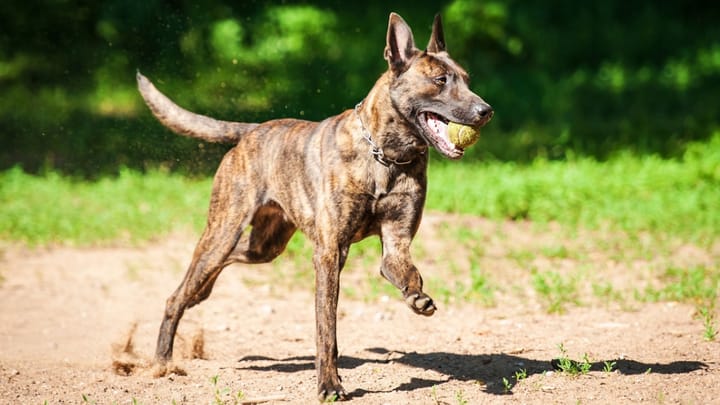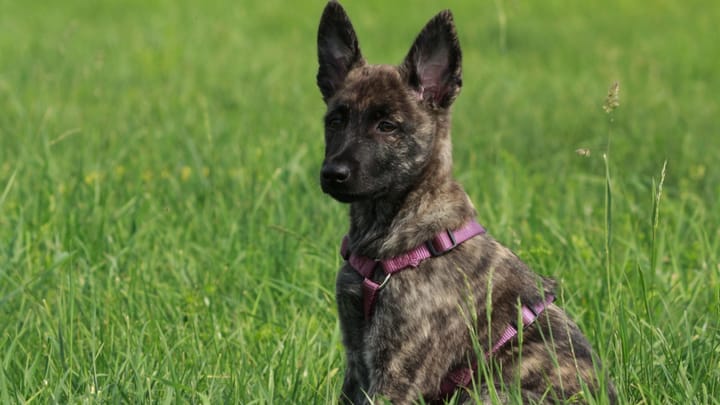Dutch Shepherd
Other names : Hollandse Herdershond, Berger Hollandais


Affectionate, obedient, intelligent, docile, vigilant, trustworthy and courageous, the Dutch Shepherd is not very demanding or resistant. They are always attentive, active and endowed with a true shepherd dog nature. They are very friendly with their masters and have difficulties being alone. Their great sensitivity sometimes leads them to become aggressive towards strangers. They are excellent guardians.
|
Life expectancy |
The Dutch Shepherd has a life expectancy of between 12 and 14 years |
|
Temperament |
|
|
Size |
Medium
|
|
Adult size |
Female
Between 22 and 24 in
Male
Between 22 and 24 in
|
|
Adult weight |
Female
Between 44 and 55 lb
Male
Between 55 and 66 lb
|
|
Coat colour
The coat is brindle, with a golden (light sand to brownish red) or silvery background. A black hair dominance is seen as a defect; however, a black muzzle is favoured. |
Black Brown Red Sand |
|
Type of coat
The coat can be short or long, depending on the variety of Dutch Shepherd. The short-haired variety has a coat with coarse, dense hair and a woolly undercoat; the long-haired variety has straight hair (which is neither curly or wavy), flattened and rough to the touch with a woolly undercoat; The wire-haired variety has a thick, coarse, tousled coat with a dense, woolly undercoat. Their heads have bushy eyebrows, beards and whiskers. |
Short Long Hard |
|
Eye colour
The eyes are dark in colour. |
Brown
|
The most common variety is the long-haired one, but this breed is almost unknown beyond the Dutch borders.
More details about the Dutch Shepherd
Dutch Shepherd: Origins and history
This dog’s origins are rather vague, some refer to a cross between the German Shepherd and other Dutch shepherds while others speak of a descent from the Belgian Shepherds, to whom this dog resembles (including the three varieties of hair). Originally from the Netherlands, this shepherd dog was (and still is) the ideal partner for Dutch shepherds. Indeed, their versatility as herding and guard dogs make them very well-rounded working dogs. It is only since the 20th century that this dog has become part of the home as a lively and sporty companion dog. Their intelligence and docility even led them to join police and army brigade ranks.
Physical characteristics of the Dutch Shepherd
The Dutch Shepherd is a medium-sized and medium-weight dog, with a muscular body and well-proportioned build. Their expression is intelligent and their temperament lively. The eyes are dark, medium sized, almond-shaped, slightly oblique and never round. The ears, small rather than large, are erect and carried forward, set high. The tail, at rest, hangs straight or slightly curved: it reaches the tip of the hock. During movement, it is elegantly raised and never rolled up; never falling back on the dog’s sides. There are three different varieties of Dutch Shepherd: short-haired, long-haired and wire-haired.
FCI classification of the Dutch Shepherd
-
Group 1 - Sheepdogs and Cattledogs (except Swiss Cattledogs)
-
Section 1 : Sheepdogs
Dutch Shepherd: Varieties
- Dutch short-haired shepherd
- Dutch long-haired shepherd
- Dutch rough-haired shepherd
Dutch Shepherd: Characteristics
Dutch Shepherd: Behaviour
Training a Dutch Shepherd
Sheepdogs such as the Dutch Shepherd are often considered to be highly intelligent and docile, and this is indeed the case for this dog. However, their training requires discipline, consistency and coherence in order for them to reach their full potential.
It is not uncommon to see behavioural troubles amongst sheepdogs due to their owners simply not being aware of the work involved in training the highly obedient sheepdog we imagine.
In fact, the Dutch Shepherd will only be cooperative if their master's attitude is one of respect and consistency. If they perceive a fault, then they will no longer feel safe with their master, and as a result of this the relationship between dog and master will suffer greatly.
Dutch Shepherd: Lifestyle
Breed compatibility Dutch Shepherd
Dutch Shepherd: Purchase price
The price of a Dutch Shepherd varies according to their origins, age, variety and sex. We do not have enough information to set an average price for a Dutch Shepher.
Concerning the average budget to support a dog of this size, it is necessary to account for approximately £40/month.
Dutch Shepherd: Shedding
Average
Hair loss varies according to the Dutch Shepherd variety. However, generally hair loss is moderate, except during moulting periods when brushing must occur daily.
Dutch Shepherd: Grooming
The varieties with tough and short hair do not require any particular maintenance; simple, regular brushing is sufficient. On the other hand, maintenance must be more rigorous for the long-haired variety in order to prevent knots from forming.
These regular brushings make it possible to avoid having to wash this dog too often. This is not a dog that needs to be groomed, in fact this could harm the protective quality of their coat.
Dutch Shepherd: Health
Life expectancy is estimated at 13 years.
This dog is a robust, strong and above all very resilient shepherd dog who is not afraid of the weather.
As a tough and passionate dog, they can work even in hot weather. However, it is not recommended to impose intense activities on him/her when temperatures are extreme, one must remain reasonable.
This dog has the physical capabilities to live outside without any problems. However, to maintain relationships and their psychological well-being, it is important to integrate them as much as possible into family life and avoid leaving them outside constantly.
This work hound must not become large. If their needs are met and they benefit from an appropriate and high-quality diet, there is no reason for them to gain weight in view of their active lifestyle.
The Dutch Shepherd has no particular predispositions to certain diseases. However, like all medium to large dogs, hip dysplasia should be monitored, although modern breeds tend to see a reduction in this condition.








